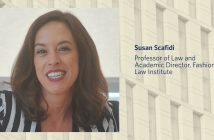Legal scholars gathered at Fordham Law School on Friday for an all-day colloquium titled “Lawyering in the Regulatory State.” Participants discussed a broad range of topics related to the work of lawyers who appear before administrative agencies, who represent agencies, or who perform other work relating to administrative regulation.
The gathering featured 14 authors and other law faculty who discussed their own and each others’ works-in-progress. Some participants addressed unique aspects of the work of lawyers representing applicants for disability insurance, those representing patent applicants, and those serving as bankruptcy examiners. Others explored whether private or public lawyers should have special or additional responsibilities to serve as “whistle-blowers” or “gate-keepers” for the public’s protection. Still others presented the results of empirical work on the role of lawyers for state agencies, on the importance of lawyers in immigration proceedings, and on the advice lawyers give to transnational companies dealing with human rights concerns.
Fordham Law Professor Aaron Saiger presented his paper “Ethical Statutory Interpretation in Agencies Subject to Deferential Judicial Review,” which explored how federal agencies interpret statutes. He argued that, even though courts often defer to agencies’ reasonable interpretations of legislation, agencies should not simply pick from among the range of reasonable interpretations the one that best suits their policy preferences. Rather, agencies should ordinarily make their best effort to interpret the law using conventional principles of interpretation.
“My belief from talking to federal agency people is most agencies proceed under the system with the view that anything the courts accept is legitimate for them to do,” Saiger said. “There’s no point in which they say, ‘What does the statute mean?’” he added.
Saiger’s views precipitated a lively discussion, with some participants offering support and others asking probing questions. Bruce Green, Louis Stein Chair of Law and Director of the Stein Center for Law and Ethics, who organized the colloquium and served as one of the moderators, offered up support for Saiger’s argument. He noted that when government lawyers defend an agency’s interpretation in the courts, the lawyers would be uncomfortable conceding that the agency was acting on its policy preference rather than on its sincere view of the best meaning of the law in question.
Other speakers came from Stanford, UCLA, the University of Virginia, the University of Alberta (Canada), and the Australian National University College of Law. In addition to Professors Saiger and Green, Fordham Professors Russell Pearce and Benjamin Zipursky participated in the discussions.
The event was co-sponsored by the Stein Center and the Fordham Law Review, which will publish speakers’ articles in a special book in April 2016. Each year for more than 20 years, the Stein Center and the Law Review have worked together to collect scholarship on a theme relating to the legal profession and legal ethics. The October 2016 colloquium will be “Civil Litigation Ethics at a Time of Vanishing Trials.”




